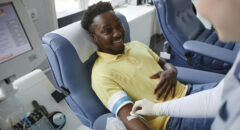
Prostate cancer screenings are a powerful preventative tool that every Black man should have in his health arsenal.
But on Monday, May 21, 2012, U.S. Preventive Services Task Force, an independent group of medical experts in prevention and evidence-based medicine, advised that physicians no longer offer routine screening for prostate cancer with the PSA (prostate specific antigen) blood test.
Celebrate great health! LIKE BlackDoctor.org on Facebook!
Previous guidelines had stated that most men should undergo screening for prostate cancer with the PSA blood test beginning at age 50 or much earlier if they’re at high risk for prostate cancer.
The task force’s reasoning for recommending against routine PSA screening in men without symptoms was that routine screening often lead to the over-diagnosis of prostate cancer and unnecessary treatment that can leave men impotent and incontinent. The task force concluded screening may only help one man in every 1,000 to avoid dying from prostate cancer; whereas up to five in 1,000 men will die within a month of prostate cancer surgery, the panel said, and between 10 and 70 per 1,000 men will suffer lifelong adverse effects, such as urinary incontinence, erectile dysfunction and bowel dysfunction.
So how does this new recommendation relate to black men’s health? About 242,000 new cases of prostate cancer will be diagnosed in Americans this year, and about 28,000 will die from it, according to the U.S. National Cancer Institute. Prostate cancer is the fourth most common cause of death in black men.
Here are a few more unfortunate facts about prostate cancer in black men:
• The worldwide incidence of prostate cancer is higher among American black men than any other male group.
• Black men in America continue to have the highest incidence rate of prostate cancer in the world — 180.6 per 100,000 population.
• Between 1996 and 2000 in the United States, the death rate of prostate cancer among black men was more than double that of white men.
• Among black men, 19 percent — nearly one in five — will be diagnosed with prostate cancer, and five percent of those will die from this disease.
• African-American men with an immediate family member who had prostate cancer have a one in three chance of developing the disease. Their risk rises to 83 percent with two immediate family members having the disease, and skyrockets to 97 percent if they have three immediate family members who developed prostate cancer.
It is not clear that the studies on which the task force made its recommendations included sufficient numbers of black men, despite the fact that they have the highest disease burden of all ethnic and racial groups. Furthermore, the task force is made up of the same panel that in 2009 rejected regular mammograms for women in their 40s, after also concluding the benefits don’t outweigh the harms; in spite of the fact that black women in their twenties to fifties are twice as likely to die of breast cancer as white women who have breast cancer and about 33% of African-American women who get breast cancer are younger than 50 years old.
I’m not sure what’s behind the task force’s recommendations – just ignorance of the facts or indifference to the health concerns of minority populations, but this decision does not preclude a man choosing to be screened. There’s just no other way to detect prostate cancer early than through PSA testing.
Furthermore not everyone agrees with the task force recommendations: A spokesman for the Prostate Cancer Foundation, Dan Zenka, described the proposed recommendation as “a tremendous mistake.” The American Urological Association said there is strong evidence that PSA testing saves lives. Dr. Otis Brawley, chief medical officer at the American Cancer Society and an outspoken figure on the pros and cons of cancer screening tests, encouraged men to make their own choice about PSA screening while keeping the risks and benefits in mind. Certain men, including blacks and those with a family history of the disease, are at significantly higher risk of developing prostate cancer, he noted.
The American Cancer Society recommends that African-American men discuss testing with their doctor at age 45, or at age 40 if they have several close relatives who have had prostate cancer before age 65.
No one really knows why African-American men are more likely to develop prostate cancer, but we know that they are more likely to die from prostate cancer in part because of delayed diagnosis. The new task force recommendations only add more confusion about when to screen or when not to screen which may lead to even further delayed diagnosis of prostate cancer in black men. The bottom line is black men and all men for that matter need to have a discussion with their doctor about the benefits and limitations of screening for early prostate cancer detection.
What are the signs of prostate cancer?
Signs and symptoms of prostate cancer can include:
• Urinating in the middle of the night,
• Needing to urinate more frequently, and
• Feeling like the bladder doesn’t completely empty.
• Blood in the urine may also be a sign of prostate cancer.
Early prostate cancer screening is important because by the time that symptoms appear, the cancer is likely in an advanced stage. The earlier the prostate cancer is caught — before symptoms appear — the better the chances for recovery.








